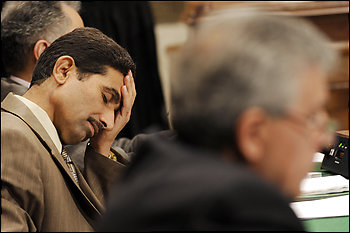
Salam Adhoob, former investigator for Iraq’s Commission on Public Integrity, at the Democratic Policy Committee hearing on waste and fraud in Iraq. (By Susan Walsh — Associated Press)
A former Iraqi official estimated yesterday that more than $13 billion meant for reconstruction projects in Iraq was wasted or stolen through elaborate fraud schemes.
Salam Adhoob, a former chief investigator for Iraq’s Commission on Public Integrity, told the Senate Democratic Policy Committee, an arm of the Democratic caucus, that an Iraqi auditing bureau “could not properly account for” the money.
While many of the projects audited “were not needed — and many were never built,” he said, “this very real fact remains: Billions of American dollars that paid for these projects are now gone.”
He said a report that went to Iraqi Prime Minister Nouri al-Maliki and other top Iraqi officials was never published because “nobody cares” about investigating such cases. Many investigators, he said, feared for their safety because 32 of his co-workers have been murdered.
Adhoob said he reported the abuses to the U.S. Special Inspector General for Iraq Reconstruction, an agency charged by Congress with helping to root out cases of waste, fraud and abuse in the nearly $50 billion U.S. reconstruction effort. SIGIR spokeswoman Kristine Belisle said her agency continues to “actively follow up” on Adhoob’s information, but she would not discuss ongoing investigations.
Adhoob was one of three Iraqi men who testified before the Democratic panel yesterday. Abbas S. Mehdi, a former Iraqi official who held a cabinet-level post, told of widespread corruption. And an Iraqi American who for five years has been a senior adviser to Defense and State department officials in Iraq testified in silhouette by video from an undisclosed location because, he said, he feared for his safety. In a modified voice, he said Iraqi government officials worked with al-Qaeda terrorists at the Baiji refinery to steal oil to sell on the black market.
Sen. Byron L. Dorgan (D-N.D.), who chairs the committee, said that “taxpayers have been bled dry with massive misuse of public dollars.”
“It is all pretty sobering,” he added later. “Our country cannot continue to be blind or oblivious to what is happening.”
Adhoob, who worked for three years at the Iraqi agency and oversaw 200 investigators and other employees, said he had a “firsthand, up-close look at corruption” and eventually had to flee the country because of death threats. He said his agency — the Commission on Public Integrity, which U.S. government officials say is the equivalent of the FBI — estimates that an additional $9 billion in U.S. funds was lost because of corruption and waste. Because the $13 billion figure came from the Iraqi auditing bureau and the $9 billion figure came from Adhoob’s agency, Dorgan’s staff members said there could be some overlap.
Adhoob’s agency has been accused of pursuing investigations against political rivals.
In one scheme described by Adhoob, Iraqi Defense Ministry officials helped set up two front companies that were to buy airplanes, armored vehicles, guns and other equipment with $1.7 billion in U.S. funds. The companies were paid, but in some cases they delivered only “a small percentage” of the equipment that had been ordered and, in one case, delivered bulletproof vests that were defective and could not be used.
The companies also overcharged for military helicopters and tried to deliver aircraft that were more than 25 years old, he said. Instead of demanding the money back, Adhoob said, the Defense Ministry renegotiated with the companies for “a series of mobile toilets and kitchens — which have never been delivered.”
Adhoob said some of the investigations conducted by his agency and others uncovered “ghost projects” that never existed or instances in which Iraqi and U.S. contractors did poor-quality work. In one case, $24.4 million was spent on an electricity project in Nineveh province but an oversight agency found that it “existed only on paper.”
Investigations by Iraqi oversight agencies also found that some of the money sent to the Defense Ministry was diverted to al-Qaeda in Iraq, Adhoob said, and deposited into banks in Jordan and elsewhere.
Staff researcher Julie Tate contributed to this report.
By Dana Hedgpeth
Washington Post Staff Writer
Tuesday, September 23, 2008; Page A19
Source: The Washington Post